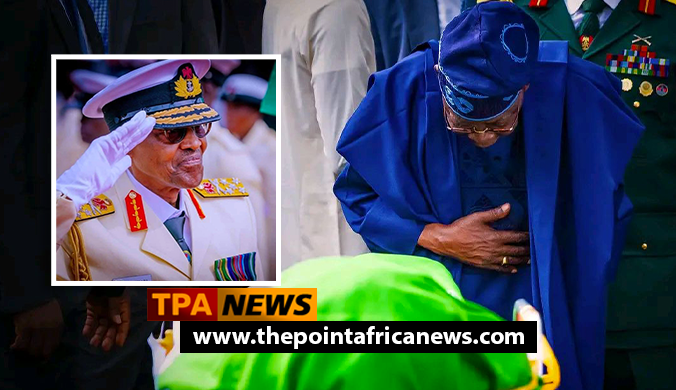By: TPA News Desk | editor@thepointafricanews.com

The passing of former Nigerian President Muhammadu Buhari on Sunday, July 13, 2025, at the age of 82, marks the end of an era for a figure who profoundly shaped Nigeria’s political landscape across several decades. Laid to rest on Tuesday, July 15, in his hometown of Daura, Katsina State, Buhari’s life was a testament to resilience and unwavering commitment to public service, yet also a reflection of Nigeria’s complex journey through military rule and nascent democracy.
Born in December 1942 in Daura, Buhari’s career was defined by a remarkable duality: first as a stern military leader who seized power in a coup, and later as a democratically elected president who broke the mold by unseating an incumbent.
His initial foray into leadership came on December 31, 1983, when, as a Major General in the Nigerian Army, he became the military Head of State. His 20-month rule was marked by a strict “War Against Indiscipline” (WAI) campaign, aimed at instilling order, combating corruption, and promoting nationalistic values. While many Nigerians appreciated his no-nonsense approach to discipline and his attempts to curb corruption through decrees and tribunals, his authoritarian methods, including the detention of political opponents and critics, also drew significant controversy and concern for human rights. His regime ended abruptly in August 1985 when he was overthrown by fellow officers.
After his release from detention and a period out of direct power, Buhari re-emerged on the political scene in the early 2000s, this time as a presidential aspirant in Nigeria’s burgeoning democracy. Following three unsuccessful bids in 2003, 2007, and 2011, his persistence paid off in 2015. Riding a wave of public discontent against corruption and insecurity, and campaigning on an image of incorruptibility and discipline, he made history by becoming the first opposition candidate to defeat an incumbent president, Goodluck Jonathan. He was re-elected for a second term in 2019.
His two terms as democratic president (2015-2023) were characterized by ambitious promises to tackle insecurity, revitalize the economy, and eradicate corruption. While his administration recorded some achievements, particularly in infrastructure development and sustained efforts in anti-corruption drives (which saw some high-profile individuals prosecuted or disciplined), his tenure was also met with significant challenges and criticisms. Insecurity, particularly banditry and kidnapping in the North-West and North-Central regions, intensified despite military efforts. The economy faced multiple recessions, high inflation, and currency depreciation, leading to widespread hardship for many Nigerians. His government’s response to the 2020 #EndSARS protests against police brutality also drew international condemnation following the use of force against demonstrators.
For his ardent supporters, particularly in Northern Nigeria, Buhari remained an icon of honesty, integrity, and a champion of the common man, a rare commodity in Nigerian politics. They lauded his personal austerity and perceived dedication to nation-building. However, for a significant portion of the population, especially in the south and among the youth, his legacy is viewed through a lens of missed opportunities, deepening divisions, and a failure to address the core economic and security challenges that plagued the nation.







Leave a Reply